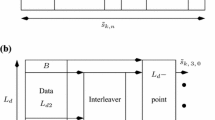Abstract
In this paper we propose a Multiuser receiver architecture which removes the Multiple Access Interference (Mai) by means of a Soft Input Soft Output (siso) multiuser detector followed by a bank of channel decoders. The extrinsic information at the output of the channel decoders are used to estimate the values of the interfering bits and the SISO multiuser detector subtracts the vector of the interfering bits from the incoming signal. The resulting vector is then filtered by an adaptive mmse filter to help remove the residual mai. The paper examines the use of such a receiver in the context of a synchronous awgn channel and then we generalize to the case of asynchronous multipath fading channels.
Résumé
Dans cet article nous étudions la structure d’un récepteur multiutilisateurs qui élimine le brouillage d’accès multiple à l’aide d’un détecteur multiutilisateurs à sorties pondérées suivi d’un bane de décodeurs de canal. L’information extrinsèque en sortie de chaque décodeur de canal est utilisée pour estimer la valeur des bits brouilleurs et le détecteur multiutilisateurs retranche le vecteur des bits brouilleurs au signal d’entrée. Unfiltrage adaptatif selon les moindres carres est alors appliqué pour éliminer le brouillage d’accès multiple rèsiduel. Nous examinons l’implantation de ce récepteur dans les contextes d’un système synchrone à bruit additif gaussien et d’un système asynchrone à trajets multiples.
Similar content being viewed by others

References
Verdu (S.), Minimum probability of error for asynchronous Gaussian multiple-access channels,ieee Trans. Inform, Theory,it-32, pp. 85–96, Jan. 1986.
Giallorenzi (T.R.), Wilson (S.G.), Multiuser ML sequence estimation for convolutional coded asynchronous ds-cdma systems,ieee Trans. Commun., com-44, n°9, pp. 1183–1196, Sep. 1996.
Valenti (M.C.), Woerner (B.D.), Combined mutiuser reception and channel decoding for tdma cellular systems,Proc. ieee Vehicular Technology Conf., pp 1915–1919, Ottawa 98.
Hagenauer (J.), Forward error correcting for CDMA systems, inProc. ieee Int. Symp. Spread Spectrum Techniques and Applications, Mainz, Germany, Sep. 96, pp. 566–569.
Alexander (P.D.), Grant (A.J.), Reed (M.C.), Iterative detection in code-division multiple-access with error control coding,European Trans. Telecommun. Special Issue CDMA Techniques Wireless Commun. Syst., 9, pp. 419–425, Sept./Oct. 1998.
Alexander (P.D.), Reed (M.C.), Asenstorfer (J.A.), Schlegel (C.B.), Iterative Multiuser Interference Reduction: Turbo CDMA,ieee Trans. Commun., COM-47, n°7, pp 1008–1014, July 1999.
Laot (C), Egalisation autodidacte et turbo-égalisation: application aux canaux sélectifs en fréquence, PhD Thesis, Rennes I University, July 97.
DOUILLARD (C), JEZEQUEL (M.), PlCART (A.), DlDffiR (P.), GLAvieux (A.), Iterative correction of intersymbol interference: Turbo-equalization,European Trans. Telecommun., 6, pp. 507–511, Sept. 1995.
Wang (X.), Poor (H.V.), Iterative (Turbo) Soft Interference Cancellation and Decoding for Coded CDMA,ieee Trans. Commun., COM-47, n°7, pp 1046–1061, July 1999.
Poor (H.V.), Verdu (S.), Probability of error in mmse multiuser detection,ieee Trans. Inform. Theory, IT-43, pp. 858–871, May 1997.
Jakes (W.C.), Microwave Mobile Communications,John Wiley & sons, 1974.
Verdu (S.), Recent progress in multi-user detection, Advances in Commun. and Signal Processing.,Springer Verlag (N.Y.), 1989, pp. 164–175.
Bouillon (T.L.), Odell (PL.), Generalised Inverse Matrices, Wiley-Interscience, 1971.
Andersen (J.D.), Interleaver design for turbo coding, inProc. Int. Symposium on Turbo Codes and Related Topics, Brest, France, Sep. 97, pp. 154–156.
Varanasi (M.K.), Aazhang (B.), Near-optimum detection in synchronous code-division multiple-access systems,ieee Trans. Commun.,39, pp. 725–736, May 1991.
Tarkoy (F.), Iterative multiuser decoding for asynchronous users, inProc. ieee Int. Symp. on Inform. Theory (isit 97), Ulm, Germany, June 97, p. 30.
Author information
Authors and Affiliations
Rights and permissions
About this article
Cite this article
Cances, J.P., Meghdadi, V. & Mohammadkhani, G.R. Turbo soft interference cancellation for coded asynchronous ds/cdma. Ann. Télécommun. 56, 422–434 (2001). https://doi.org/10.1007/BF02995453
Received:
Accepted:
Issue Date:
DOI: https://doi.org/10.1007/BF02995453
Key words
- Mobile radiocommunication
- Cellular network
- Code division multiple access
- Direct sequence spread spectrum
- Multichannel detection
- Signal interference
- Multipath propagation
- Rayleigh fading
- Convolutional code
- Turbo code



